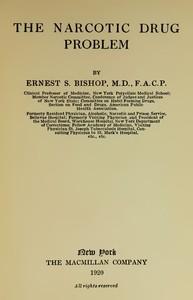|
|
Read this ebook for free! No credit card needed, absolutely nothing to pay.Words: 52649 in 14 pages
This is an ebook sharing website. You can read the uploaded ebooks for free here. No credit cards needed, nothing to pay. If you want to own a digital copy of the ebook, or want to read offline with your favorite ebook-reader, then you can choose to buy and download the ebook.

: The narcotic drug problem by Bishop Ernest S Ernest Simons - Drug addiction@FreeBooksThu 08 Jun, 2023 PREFACE vii THE NARCOTIC DRUG PROBLEM INTRODUCTION It is a fact becoming more and more obvious that too little study and effort to interpret their physical condition have been given to those unfortunates suffering from narcotic drug addiction. We have neglected their disease in its origin and subsequent progress and formed our conception of its character from fully developed conditions and spectacular end-results. We have seen some of them during or after our fruitless efforts at treatment, their tortures and poor physical condition overcoming their resolutions, until they plead for and attempted to obtain more of their drug. We have seen others exhausted, starved, with locked-up elimination, toxic from self-made poisons of faulty metabolism, worn with the struggle of concealment and hopeless resistance, and for the time being more or less irresponsible beings, made so, not because of their addiction-disease itself, but because they were hopeless and discouraged and did not know which way to turn for relief. What literature has appeared on the subject has usually pictured them as weak-minded, deteriorated wretches, mental and moral derelicts, pandering to morbid sensuality; taking a drug to soothe them into supposed dream states and give them languorous delight; held by most of us in dislike and disgust, and regarded as so depraved that their rescue was impossible and they unworthy of its attempt. We have overlooked, ignored or misinterpreted intense physical agony and symptomatology, and regarded failure to abstain from narcotics as evidence of weak will-power or lack of desire to forego supposed morbid pleasure. We have prayed over our addicts, cajoled them, exhorted them, imprisoned them, treated them as insane and made them social outcasts; either refused them admission to our hospitals or turned them out after ineffective treatment with their addiction still fastened to them. To a great extent the above has been their experience and history. In great numbers they have realized our failure to appreciate their condition and to remedy it, and have after desperate trials of quacks, charlatans and exploited "cures," finally accepted their slavery and by regulation of their drug and life, their addiction unsuspected, maintained a socially and economically normal existence. Some failing in this, perhaps broken and impoverished, their addiction recognized, have become social and economic derelicts and often public charges. From these last, together with the addicted individuals from the class of the fundamentally unfit, we have painted our addiction picture. Confined and observed by the custodial official and the doctor of the institution of correction and restraint, or concealed as family skeletons in many homes, descriptions of them have given to the narcotic addicts as a whole their popular status--cases of mental and moral disorder due to supposed drug action or habit deterioration, and based upon inherent lack of mental and moral stamina. It was with the above conception of these addiction conditions that I began my work in the Alcoholic, Narcotic and Prison Service of Bellevue Hospital, attracted to the service not by hope of helping nor by interest in "jags" and "dope fiends" as I then considered them, but by the mass of clinical material available for surgical and medical diagnosis and study which was daily admitted to those wards. When I left the service after sixteen months of day and night observation, with personal oversight and attempt to care for in the neighborhood of a thousand admissions a month, my early and faulty conception of narcotic addicts was replaced by a settled conviction that these cases were primarily medical problems. I realized that these patients were people sick of a definite disease condition, and that until we recognized, understood and treated this condition, and removed the stigma of mental and moral taint from those cases in which it did not exist, we should make little headway towards solution of the problem of addiction. It is a fact that the narcotic drugs may afford pleasurable sensations to some of those not yet fully addicted to them, and that this effect has been sought by the mentally and morally inferior purely for its enjoyment for the same reasons and in the same spirit that individuals of this type tend to yield themselves to morbid impulses, curiosities, excesses and indulgences. Experience does not teach them intelligence in the management of opiate addiction and they tend to complicate it with cocaine and other indulgence, increasing their irresponsibility and conducing to their earlier self-elimination. Wide and varied experience, however, hospital and private, with careful analysis of history of development, and consideration of the individual case, demonstrates the fact that a majority of narcotic addicts do not belong to this last described type of individuals. It will be found upon careful examination that they are average individuals in their mental and moral fundamentals. Among them are many men and women of high ideals and worthy accomplishments, whose knowledge of narcotic administration was first gained by "withdrawal" agonies following cessation of medication, who have never experienced pleasure from narcotic drug, are normal mentally and morally, and unquestionably victims of a purely physical affliction. Free books android app tbrJar TBR JAR Read Free books online gutenberg More posts by @FreeBooks
: A short sketch of the evidence for the abolition of the slave trade delivered before a committee of the House of Commons by Crafton William Bell - Speeches addresses etc. English; Slave trade Great Britain@FreeBooksThu 08 Jun, 2023

: Roi de Camargue by Aicard Jean Roux George Illustrator - French fiction 19th century@FreeBooksThu 08 Jun, 2023
|
Terms of Use Stock Market News! © gutenberg.org.in2025 All Rights reserved.






